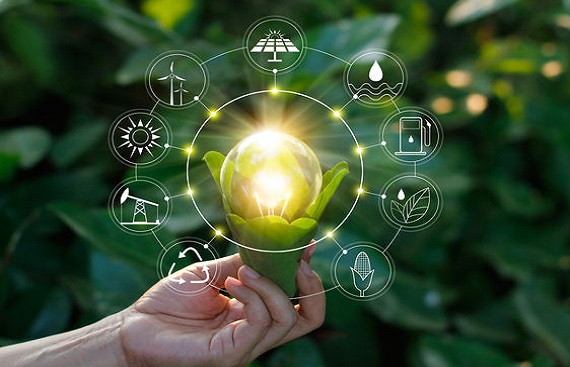Sustainable technology is no longer a concept of the future; it’s happening now, transforming the way we live and do business. With global concerns around climate change and environmental degradation, companies worldwide are racing to create solutions that reduce carbon footprints, promote renewable energy, and embrace sustainability. In this article, we’ll explore the rise of green technology, its impact on various industries, and what the future holds for a more eco-conscious world.
The Importance of Green Tech Innovations
Green tech innovations play a critical role in addressing environmental challenges. Traditional industries, from manufacturing to agriculture, have long relied on processes that harm the planet. However, green technology aims to minimize this damage by introducing more efficient, eco-friendly alternatives. Why is this important? Because without such innovations, we risk irreversible damage to ecosystems, climate, and future generations.
ALSO SEE: A Comprehensive Look at the Growth of Software as a Service
How Green Technology Is Changing the World
Green technology encompasses everything from renewable energy to waste management. It is about reducing the negative impacts of technology and industry on the environment. Solar panels, wind turbines, and electric vehicles are just a few examples of how this technology is making a difference. But the changes don’t stop there; businesses are finding innovative ways to reduce energy consumption, waste production, and greenhouse gas emissions.
The Rise of Renewable Energy Solutions
Renewable energy is at the heart of green tech innovations. Solar power, wind energy, and hydropower are leading the way in reducing reliance on fossil fuels. These energy sources are clean, abundant, and increasingly affordable. What’s even more exciting? The rapid advancements in renewable energy technology are making it possible for businesses and homes to adopt these solutions without breaking the bank.
Solar Power: The Bright Future of Energy
Solar power has become one of the most talked-about green technologies in recent years. Solar panels convert sunlight into electricity, providing a renewable and sustainable energy source. As technology evolves, solar panels have become more efficient and affordable, leading to widespread adoption. From residential rooftops to large solar farms, this technology is lighting the way to a greener future.
Wind Energy: Harnessing the Power of Nature
Wind energy is another essential player in the green tech revolution. By capturing the kinetic energy of wind with turbines, this technology generates electricity without emitting harmful pollutants. Wind farms are becoming a common sight worldwide, as countries and companies look to capitalize on this clean, renewable energy source. As we continue to advance, expect to see wind turbines in places you never imagined.
Electric Vehicles: Driving Towards a Cleaner Future
The transportation industry is a significant contributor to carbon emissions, but electric vehicles (EVs) are changing that. EVs run on electricity, significantly reducing the need for gasoline and diesel. With major car manufacturers investing in electric models, the future of transportation is undoubtedly electric. Not only do these vehicles help the environment, but they also offer cost savings on fuel and maintenance.
The Role of Energy Efficiency in Green Technology
While renewable energy gets much of the attention, energy efficiency is equally important in the green tech landscape. Energy-efficient appliances, buildings, and industrial processes reduce the amount of energy needed to perform the same tasks. For businesses, this means lower operational costs, and for the environment, it means reduced emissions and resource depletion. It’s a win-win.
Green Tech in the Construction Industry
The construction industry has long been criticized for its environmental impact, from deforestation to high energy consumption. However, green technology is now playing a significant role in creating more sustainable building practices. Innovations like energy-efficient insulation, smart thermostats, and eco-friendly building materials are leading the charge in sustainable construction.
Smart Homes: The Intersection of Tech and Sustainability
Smart homes are a perfect example of how technology can enhance sustainability. With features like automated lighting, smart thermostats, and energy-efficient appliances, homeowners can significantly reduce their energy consumption. Smart home systems not only make life more convenient but also promote a more eco-friendly lifestyle by optimizing energy use and reducing waste.
Sustainable Agriculture: Feeding the World with Green Tech
Agriculture is one of the most resource-intensive industries, consuming vast amounts of water, energy, and land. Fortunately, green tech is revolutionizing the way we grow food. From precision farming to vertical agriculture, these innovations allow farmers to produce more food with fewer resources. Sustainable farming practices, powered by green tech, are essential for feeding a growing population without destroying the planet.
Water Conservation Technologies: Saving Our Most Precious Resource
Water is a finite resource, and with climate change exacerbating droughts and water scarcity, conservation is more critical than ever. Green tech innovations are helping to preserve and efficiently use water. Technologies like drip irrigation systems, water recycling, and desalination are becoming more prevalent, ensuring that communities and industries can access clean water without overexploiting natural sources.
Green Tech in Waste Management: Turning Trash into Treasure
Waste management is another area where green tech is making a significant impact. Technologies that enable recycling, composting, and waste-to-energy conversion are helping reduce the amount of waste that ends up in landfills. In some cases, companies are even finding ways to turn waste materials into new products, creating a circular economy that benefits both business and the environment.
Green Energy Storage Solutions: Powering the Future
Renewable energy sources like wind and solar are fantastic, but what happens when the sun isn’t shining, or the wind isn’t blowing? That’s where energy storage solutions come in. Advancements in battery technology, like lithium-ion and solid-state batteries, are making it possible to store renewable energy for later use, ensuring a reliable supply of clean energy even when nature isn’t cooperating.
The Business Benefits of Green Technology
Many businesses are discovering that going green is not just good for the planet, but it’s also good for their bottom line. From reducing energy costs to improving brand reputation, adopting green tech can give companies a competitive edge. As consumers become more eco-conscious, businesses that prioritize sustainability are more likely to succeed in the long run.
The Future of Green Tech: What’s Next?
As green technology continues to advance, the possibilities are endless. From bioenergy to carbon capture, emerging technologies are poised to revolutionize industries and drastically reduce humanity’s environmental impact. The future is green, and companies that embrace these innovations will lead the way towards a more sustainable world.
Conclusion: Embracing Green Tech for a Sustainable Tomorrow
Green tech innovations are reshaping industries and driving us towards a more sustainable future. From renewable energy solutions to waste management technologies, the potential for positive change is enormous. By embracing these innovations, we can reduce our environmental footprint, conserve resources, and create a healthier planet for generations to come.
FAQs
1. What is green technology?
Green technology refers to innovations that are designed to reduce environmental impact, promote sustainability, and conserve resources.
2. How does solar power contribute to sustainability?
Solar power generates electricity from the sun, providing a clean, renewable energy source that reduces reliance on fossil fuels and lowers carbon emissions.
3. Why are electric vehicles considered eco-friendly?
Electric vehicles produce zero tailpipe emissions and run on electricity rather than gasoline, reducing the overall environmental impact of transportation.
4. What are some examples of energy-efficient technologies?
Examples of energy-efficient technologies include LED lighting, smart thermostats, and energy-efficient appliances that reduce energy consumption.
5. How can businesses benefit from adopting green tech?
Businesses that adopt green tech can reduce operating costs, improve brand reputation, and attract eco-conscious consumers, giving them a competitive advantage in the market.






